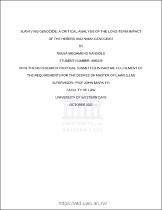| dc.contributor.advisor | Iyi, John-Mark | |
| dc.contributor.author | Nangolo, Ruusa Megameno | |
| dc.date.accessioned | 2023-05-15T07:42:16Z | |
| dc.date.available | 2023-05-15T07:42:16Z | |
| dc.date.issued | 2022 | |
| dc.identifier.uri | http://hdl.handle.net/11394/9948 | |
| dc.description | Magister Legum - LLM | en_US |
| dc.description.abstract | The period 1904–1908 is historically significant among the Herero and Nama, as they still suffer from the impact of the genocide committed by the German colonisers. Nearly 80 per cent of the Otjiherero-speaking people and 50 per cent of Nama-speaking people were brutally killed, tortured and raped after reclaiming their lands from the German settlers. Since this event took place before Namibia’s independence in 1990, little was said about the brutal killing until after Namibian independence, when the progeny of the genocide victims sought answers and justice for the act of colonial injustices. They subsequently filed a claim in Washington DC in 2001 for compensation payments totaling over two billion US dollars by the German government. | en_US |
| dc.language.iso | en | en_US |
| dc.publisher | University of the Western Cape | en_US |
| dc.subject | Genocide | en_US |
| dc.subject | Colonialism | en_US |
| dc.subject | Legislation law | en_US |
| dc.subject | Namibia | en_US |
| dc.subject | Independence | en_US |
| dc.title | Surviving genocide: A critical analysis of the long-term impact of the Herero and Nama genocides | en_US |
| dc.rights.holder | University of the Western Cape | en_US |

